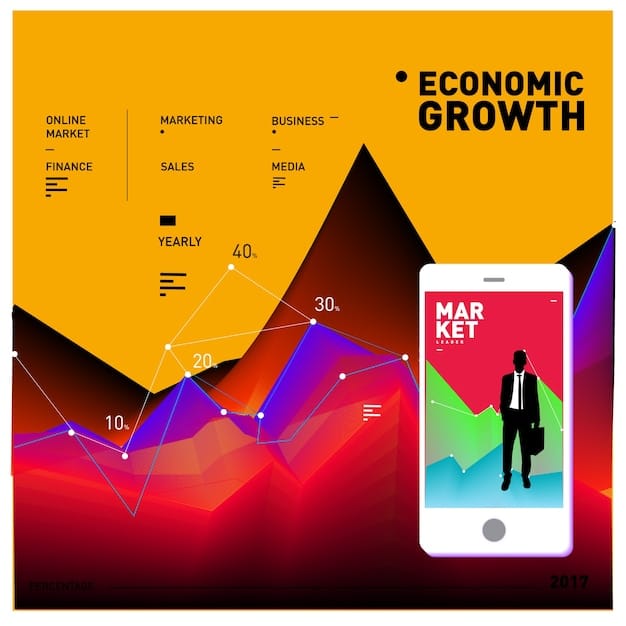E-commerce Influencer Marketing Platforms: A 3-Year Investment Outlook

E-commerce Influencer Marketing Platforms: A 3-Year Investment Outlook explores the dynamic landscape of influencer marketing, offering projections and insights into how these platforms are expected to evolve and impact e-commerce strategies in the near future.
Navigating the ever-evolving world of e-commerce requires staying ahead of the curve, and e-commerce influencer marketing platforms: a 3-year investment outlook, provides just that, offering a comprehensive analysis of where these platforms are headed and how smart investments can capitalize on emerging trends. Let’s dive in!
Understanding E-commerce Influencer Marketing Platforms
E-commerce influencer marketing platforms connect brands with influencers to promote products and services. Understanding the current state of these platforms is crucial for making informed investment decisions for the upcoming years.
The Current Landscape
Currently, these platforms are characterized by a mix of large, established players and smaller, niche platforms that cater to specific industries or influencer types. The emphasis is on authenticity and engagement.
Many platforms offer tools for influencer discovery, campaign management, and performance tracking, making it easier for brands to run effective campaigns.
- Platform Specialization: Platforms are increasingly specializing in specific niches (e.g., beauty, gaming).
- Data Analytics: Advanced analytics provide insights into campaign performance and ROI.
- AI Integration: Artificial intelligence is being used to match brands with suitable influencers.
The market is competitive, with new platforms emerging regularly, each trying to offer unique features and value propositions.
Key Trends Shaping the Next 3 Years
Several trends are expected to significantly impact e-commerce influencer marketing platforms over the next three years. Anticipating these trends can guide strategic investment decisions.

Rise of Micro and Nano-Influencers
Micro and nano-influencers, with their smaller but highly engaged audiences, are becoming increasingly valuable for brands. Their authenticity and relatability often lead to higher conversion rates.
Platforms are adapting to facilitate easier collaboration with these influencers, offering tools to manage and track their performance effectively.
- Authenticity Matters: Focus on genuine endorsements rather than celebrity endorsements.
- Targeted Audiences: Micro-influencers often have niche audiences that align well with specific brands.
- Cost-Effective: Engaging micro-influencers can be more budget-friendly than larger influencers.
This shift is driven by consumers’ growing skepticism toward traditional advertising and a preference for authentic recommendations from trusted sources.
The Emergence of AI and Automation
Artificial intelligence (AI) and automation are set to revolutionize e-commerce influencer marketing platforms, enhancing efficiency and effectiveness. These technologies can streamline various aspects of influencer marketing, from discovery to performance tracking.
AI-Powered Influencer Discovery
AI algorithms can analyze vast amounts of data to identify influencers who are the best fit for a brand, based on factors like audience demographics, engagement rates, and content relevance. This makes the influencer selection process more data-driven and less reliant on manual research.
AI also allows for the detection of fake followers and engagement, helping brands avoid investing in influencers with inauthentic audiences.
- Enhanced Targeting: AI can identify niche influencers that align perfectly with a brand’s target audience.
- Fraud Detection: AI algorithms can detect and flag influencers with suspicious activity.
- Predictive Analytics: AI can forecast campaign performance based on historical data.
Automation tools can handle tasks such as scheduling posts, tracking mentions, and generating reports, freeing up marketers to focus on strategy and creative development.
Investment Opportunities in Influencer Marketing Platforms
The growth of e-commerce influencer marketing presents numerous investment opportunities. Identifying promising platforms and technologies can yield significant returns.
Platforms Focusing on ROI
Platforms that prioritize ROI tracking and analytics are particularly attractive to investors. These platforms provide brands with clear insights into the effectiveness of their campaigns, enabling them to optimize their strategies.
Investing in platforms that offer advanced analytics tools can provide a competitive edge, as brands increasingly demand data-driven results.

Technologies that enhance the authenticity and transparency of influencer marketing are also worth considering, as these address growing consumer concerns about misleading endorsements.
- Data-Driven Insights: Look for platforms that offer comprehensive analytics and reporting.
- Transparency Tools: Invest in technologies that verify influencer authenticity and engagement.
- Niche Specialization: Consider platforms that cater to high-growth e-commerce segments.
Platforms that facilitate direct communication and collaboration between brands and influencers are also likely to thrive, as these foster stronger relationships and more effective campaigns.
Challenges and Risks to Consider
Despite the potential for high returns, investing in e-commerce influencer marketing platforms also involves certain challenges and risks. Being aware of these can help investors make more informed decisions.
Regulatory Scrutiny
Regulatory scrutiny of influencer marketing practices is increasing, with authorities focusing on issues such as disclosure and transparency. Platforms need to comply with these regulations to avoid legal and reputational risks.
Investors should assess platforms’ compliance measures and their ability to adapt to evolving regulatory landscapes.
- Transparency Compliance: Ensuring all influencers properly disclose sponsored content.
- Data Privacy: Adhering to data privacy regulations such as GDPR and CCPA.
- Content Standards: Managing and monitoring the content produced by influencers.
Other risks include the potential for fraud and the difficulty of measuring the true impact of influencer marketing campaigns.
Future Outlook and Predictions for 2027
Looking ahead to 2027, e-commerce influencer marketing platforms are expected to become even more sophisticated and integrated into the broader marketing ecosystem. Predicting these changes will guide future investment strategies.
The Metaverse and Virtual Influencers
The rise of the metaverse and virtual influencers presents new opportunities for e-commerce brands. Virtual influencers, created using CGI technology, can promote products and services in virtual worlds, offering a unique and engaging way to reach audiences.
Platforms that embrace these emerging trends are likely to attract significant investment.
- Metaverse Integration: Platforms that enable seamless integration with virtual worlds.
- Virtual Influencers: Investing in the development and management of CGI influencers.
- Augmented Reality: Leveraging AR technology to enhance influencer marketing campaigns.
Additionally, personalized influencer marketing experiences will become more prevalent, with brands using data to tailor campaigns to individual consumer preferences.
| Key Insights | Brief Description |
|---|---|
| 🚀 Emerging Trends | Focus on micro-influencers and AI-driven analytics for marketing. |
| 🤖 AI & Automation | AI enhances influencer discovery and fraud detection. |
| ⚖️ Challenges & Risks | Increasing regulatory scrutiny requires compliance awareness. |
| 🌐 Future Outlook | Metaverse and virtual influencers offer unique marketing opportunities. |
FAQ
▼
These are digital marketplaces connecting brands with influencers to promote products. They offer crucial tools and services to manage campaigns.
▼
AI enhances influencer discovery, ensures authentic engagement, and provides predictive analytics. This optimization ensures fraud prevention in brand campaigns.
▼
They offer authenticity and higher engagement within niche audiences. Their endorsements increase conversion rates, benefiting brands looking for targeted reach.
▼
Regulatory scrutiny focuses on transparency, data privacy, and ethical endorsements. Platforms must adhere to GDPR and FTC guidelines for operational legality.
▼
Metaverse utilization, virtual influencers, and AR-integrated campaigns present growth avenues. These technologies facilitate marketing through personal experiences.
Conclusion
In conclusion, the future of e-commerce influencer marketing platforms is bright, with numerous opportunities for investors who are willing to embrace innovation and adapt to changing market dynamics. By understanding the key trends, challenges, and investment opportunities, you can position yourself for success in this rapidly evolving industry.





